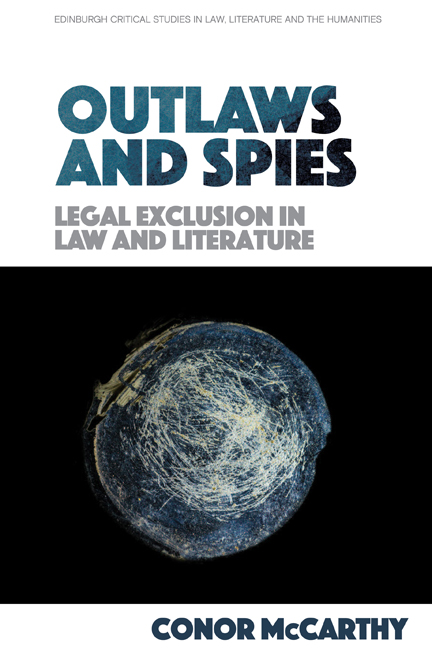Book contents
- Frontmatter
- Contents
- Acknowledgements
- Introduction
- 1 Outside the Law in the Middle Ages
- 2 Sovereign Outlaws: Shakespeare’s Second Tetralogy
- 3 The Endurance of Exclusion: Versions of Ned Kelly
- 4 ‘We’re Not Policemen’: Espionage and Law in John le Carré
- 5 ‘All Plots Tend to Move Deathward’: Plots and Consequences in Don DeLillo
- 6 Unanswered Questions: Ciaran Carson
- 7 Contesting the Virtual: William Gibson
- Conclusion
- Bibliography
- Index
Conclusion
Published online by Cambridge University Press: 08 October 2020
- Frontmatter
- Contents
- Acknowledgements
- Introduction
- 1 Outside the Law in the Middle Ages
- 2 Sovereign Outlaws: Shakespeare’s Second Tetralogy
- 3 The Endurance of Exclusion: Versions of Ned Kelly
- 4 ‘We’re Not Policemen’: Espionage and Law in John le Carré
- 5 ‘All Plots Tend to Move Deathward’: Plots and Consequences in Don DeLillo
- 6 Unanswered Questions: Ciaran Carson
- 7 Contesting the Virtual: William Gibson
- Conclusion
- Bibliography
- Index
Summary
This book has sought to pursue four arguments. Firstly, it has sought to show that legal exclusion, in various and related forms, is a tactic of power. Commentators from Maitland, to Keen, to Hobsbawm have suggested that outlawry is a phenomenon of a weak state, and there is some truth to this. Outlawry is sometimes a remedy for the weakness of power in the Middle Ages and afterwards; marginal spaces, likewise, are likely sites for banditry to flourish. But this is only part of the story. As we have argued throughout, legal exclusion is also a proactive tactic of the state, a way of asserting and defending sovereign power, and outlawry serves political as well as legal purposes across the medieval period: from Ine of Wessex's outlawry of his rival Ealdberht in the seventh century, to the outlawry of figures such as William Wallace in support of England's bid for political dominance across the archipelago in the later Middle Ages. This proactive purpose helps to explain both the endurance of outlawry well into the late nineteenth century, and its alignment with other forms of exclusion from law.
If legal exclusion is a tactic of power, it is a tactic that encompasses not only exclusion below the law, but also exclusion above it. The sovereign has extralegal status, albeit a status always debated and contested: hence Kantorowicz's formula, where the medieval English king is rex infra et super legem, a king both under and above the law. This is a tension reflected, among other places, at the heart of Shakespeare's Richard II. The extralegal status of the sovereign and the outlaw, both excluded from law, one above, one below, leads to unexpected parallels (as noted by both Derrida and Agamben). Sometimes the outlaw's challenge to sovereignty leads to a certain resemblance to the sovereign: Gamelyn is crowned king of the outlaws, and there are suggestive parallels between Robin Hood and the legendary King Arthur. In fourteenth-century Yorkshire, an outlaw named Lionel signs himself ‘king of the rout of raveners’; in nineteenth-century Australia, Michael Howe calls himself ‘Lieutenant-Governor of the Woods’, and Ned Kelly threatens his opponents with outlawry. Sometimes exclusion above and below the law work in tandem. In Richard II, after Bolingbroke's return from exile, neither he as outlaw nor Richard as sovereign have status within the law.
- Type
- Chapter
- Information
- Outlaws and SpiesLegal Exclusion in Law and Literature, pp. 201 - 208Publisher: Edinburgh University PressPrint publication year: 2020



